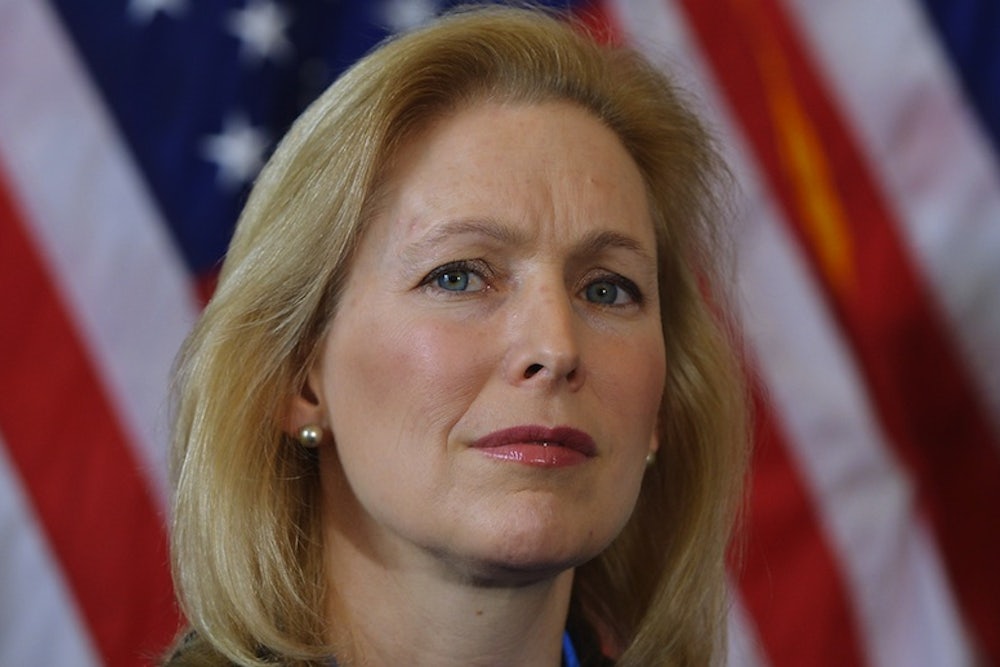Senator Kirsten Gillibrand supports the right to abortion, the Affordable Care Act, and comprehensive immigration reform. Senators Ted Cruz and Rand Paul do not. But in the most pitched battled of Gillibrand’s legislative career, her effort to reform the military justice system and combat sexual assault, these right-leaning mavericks have been among the senator from New York’s most outspoken allies. What gives?
A little background on the bill: Gillibrand believes the military’s current practice—in which commanders decide which criminal complaints from their subordinates go to trial, including cases of sexual assault—has discouraged victims from coming forward. In surveys, those who did speak out say they have been met with retribution and inaction. Under Gillibrand’s proposal, a trained prosecutor, within the military but outside the chain of command for both the victim and the perpetrator, would decide which cases go to trial. Though the impetus for the bill was sexual assault (the Pentagon estimates 26,000 service members were assaulted in 2012), the new system would apply to all crimes punishable by a year or more in prison.
Gillibrand’s bill, which she introduced as a standalone when it became apparent that it would not make it into the National Defense Authorization Act (NDAA) as an amendment, has put her at loggerheads with some of the Senate’s most venerable liberals. Her opponents include Carl Levin, the chairman of the Armed Services Committee, and Claire McCaskill, another committee member who has her own bill to combat sexual assault—and who has said she will filibuster her colleague’s proposal. Meanwhile, 54 senators, nine of them Republicans, have publicly backed the bill. Gillibrand’s supporters estimate at least a handful of other lawmakers are privately sold on the measure, meaning it may inch past the 60-vote threshold.
Long before Gillibrand had 54 lawmakers behind her, though, she had Paul and Cruz. Here are a few theories about why they teamed up with the rising liberal star.
To shake things up
Neither Cruz nor Paul has ever shied away from playing the provocateur, and Gillibrand’s bill pits them against the Pentagon, one of Washington’s most intransigent bureaucracies. Like Gillibrand, Cruz is a junior member of the Armed Services Committee, and within this body, support for the bill “didn’t break under party lines, and didn’t break under gender lines, but did break along seniority,” said Greg Jacob, a former marine and the policy director of the Service Women’s Action Network, which has lobbied for the bill. Senior members of the committee, like McCaskill, Jack Reed, or John McCain, “have longstanding relationships with the Department of Defense,” Jacob said, and seem more sympathetic to its claims that upsetting tradition could have unforeseen consequences. The most senior member of the committee listed among Gillibrand’s supporters is David Vitter, who entered the Senate in 2005.
Paul and Cruz have refused to pay deference to the Pentagon before. Paul has decried ballooning defense spending, and Cruz said he was willing to put the military on the chopping block to force Obama’s hand on the Affordable Care Act during the shutdown last fall.
To put President Obama in a bind
Though Obama has paid unprecedented attention to the problem of sexual assault in America, he has yet to express support for Gillibrand’s bill. Obama said in December, after the NDAA passed, “If I do not see the kind of progress I expect, then we will consider additional reforms.” He bought himself time, setting December 1, 2014, as a deadline for the Pentagon to show “substantial improvements” on sexual assault—and tacitly suggesting that Gillibrand and her allies should hold off until then. Though the NDAA codified sizable changes to the legal process (among them, taking away commanders’ ability to overturn verdicts, mandating dishonorable discharge for convicted service members, and allowing victims to transfer units), it did not separate justice from the chain of command. Gillibrand didn’t pull punches in her response to the president: “I do not want to wait another year to enact the one reform survivors have asked for,” she said in a statement. Cruz and Paul can see that Gillibrand is putting pressure on the White House—and, surely, are happy to help.
To attract women voters
Both Paul and Cruz have exhibited the Republican talent for alienating women—Cruz once called birth control an “abortifacient,” and as Hillary 2016 speculation heats up, Paul can’t seem to stop talking about Monica Lewinsky. As the reproductive health site RH Reality Check has suggested, “In joining with Gillibrand … Cruz and Paul, both regarded as contenders for the 2016 Republican presidential nomination, likely hope to convey some compassion for women, especially since both men hold stringent anti-choice positions—as in no exceptions for rape, incest, or health of the woman.”
Because they believe in the bill
Gillibrand’s relentless campaign has raised eyebrows on the Hill: Her staff famously keeps a whiteboard tallying her colleagues’ likely votes, and she supposedly pounced on Senator Cory Booker the day he was sworn in to gain his support. But her efforts, and the lack of partisan consensus about either her bill or McCaskill’s, have produced a serious debate about the best way forward. “The conversations we’ve been having with undecided offices have shown that they’re really undecideds,” Jacob told me. “They’re not just saying they’re undecided because they don’t want to say that they’re for the bill. The senators are really struggling, really wanting to do the right thing.”
Cruz has said he adopted Gillibrand’s position after hearing her lay out the facts in a committee meeting last June. When flabbergasted reporters asked how Cruz came to be one of just two Republicans to support her in the initial vote, he gave them a simple answer: “She made a strong argument,” he said.
This post has been updated to better describe reforms in the most recent NDAA.
